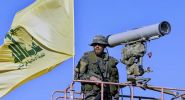
A window for peace between Israel and Lebanon just unexpectedly opened.
There was an old adage that "Lebanon will never be the first Arab state to make peace with Israel, but it won't be the last." Sadly, with Lebanese decisions dictated by the Assad family backed by Iran, that concept became obsolete. Since 1983, the Assads ensured that South Lebanon remained an active front against Israel not because it served Lebanese interests, but because it served the Assads' interests. With Israel occupying Syrian territory in the Golan Heights, Assad kept his own frontline with Israel safely cold, while keeping the one in southern Lebanon dangerously hot. For over two decades after the IDF left Lebanese territory, Hezbollah maintained military pressure on Israel not on behalf of the Lebanese, but on behalf of their masters in Damascus and Tehran. The people of Lebanon paid a heavy price.
Now, that equation has changed, with Hezbollah on its knees, Assad gone for good, and Tehran's fortunes in reverse. There is no objective reason why Israel and Lebanon cannot proceed to the next logical phase, formal peace. Lebanon is no longer held hostage to the geo-strategic needs of the Assad family.
Unlike the situation between Israel and the Syrians and Palestinians, there is no territorial issue. Shebaa Farms is a border anomaly. Lebanon's claim to it surfaced only when Hezbollah needed a pretext for continued resistance to an occupation that had ended. Privately, Bashar al-Assad maintained it was Syrian. In any case, leaders and negotiators of goodwill can devise any number of face-saving formulas for preventing this issue from stymying peace, such as leaving it in abeyance or the hands of UN peacekeepers until international arbitration clarifies its status.
The contours of an Israeli-Lebanese peace are not hard to imagine: security commitments, border delineation with procedures to reconcile any anomalies over time, mutual recognition and an end to treating each others' citizens as enemies, a ban on unauthorized military overflights, and the opening of airspace to commercial flights. UNIFIL could remain in place until the LAF gains the manpower needed to secure the south. The fate of Palestinian refugees in their country is obviously a great concern for the Lebanese, but since the Madrid Conference in 1990, it has been recognized as a matter for Israelis and Palestinians to resolve in negotiations.
A peace between Lebanon and Israel may be no warmer than the ones Egypt and Jordan have with Israel, given all the losses both sides have suffered over the decades. It doesn't matter. Even a cold peace could relieve future generations on both sides of the border of the shadow of violence.
The benefits for Lebanon seem obvious. The boost in confidence and security for Lebanon would open the way for the return of investments, expatriate deposits, tourism, and economic growth. Assistance flows, including to the south, would be considerable. Beirut would finally have a shot at once again becoming an attractive and functioning city for the interchange of commerce and ideas across the Middle East and beyond.
There are still armchair Arab nationalists who capitalize on condemning Israel and might oppose this effort, and the remnants of Hezbollah will resist. But as their power drains away, they should be challenged to offer a better alternative course for Lebanon. Their models have collapsed. After the maritime deal and the December ceasefire, it is clear that Lebanon has more to gain from diplomatic engagement with its neighbors than from hostility that only served foreign interests, not Lebanon's. The realignment of power in the region and Lebanon has made peace a real possibility. But just as windows unexpectedly open, they also narrow and close over time. The profound changes of recent months have given Lebanon a rare opportunity to act on its own interests. Those who say Lebanon should wait should be asked: Wait for what?
An opportunity to help Israel and Lebanon reach peace would no doubt be welcomed, assisted, and supported by Washington and Arab Gulf states. Tehran and Damascus are no longer in a position to object or sabotage. As the people of Lebanon finally look to the Lebanese state for a realistic return to sovereignty, the Lebanese state now has a chance to take that ultimate sovereign choice: To make peace with its neighbors.




Comments